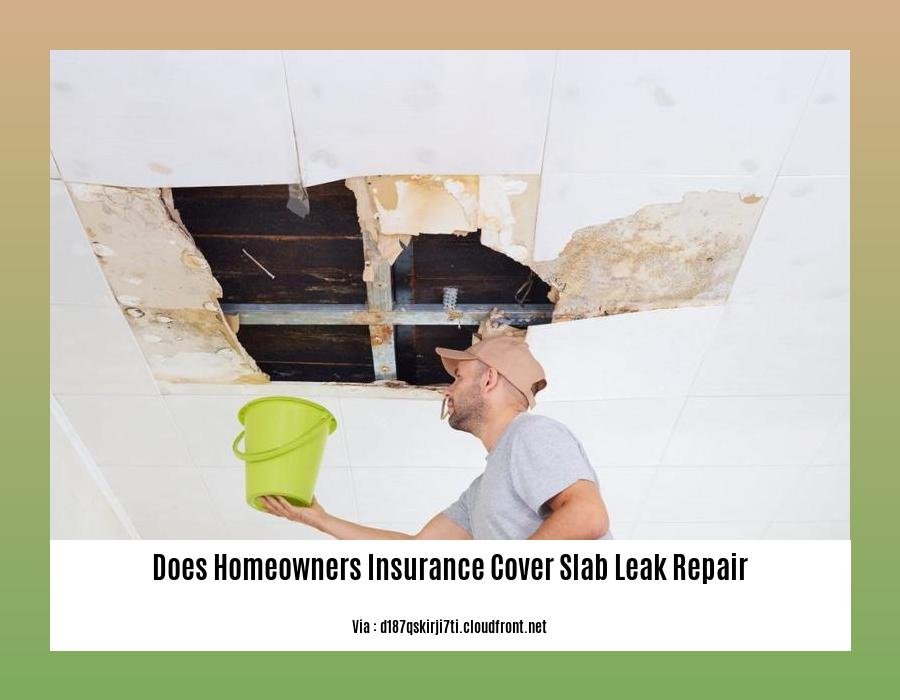Does Homeowners Insurance Cover Slab Leak Repair: A Comprehensive Guide
The question of whether homeowners insurance covers slab leak repair has become a hot topic lately. This comprehensive guide will provide valuable information on this topic, helping homeowners understand when their insurance policies can offer financial protection in such situations.
Key Takeaways:
- Homeowners insurance covers slab leaks and water damage from burst pipes, but not the cost of pipe repairs.
- Drywall and furniture damage caused by slab leaks are covered, but removing the slab to repair or replace pipes is not.
- Water damage from slab leaks, such as drywall or furniture damage, is covered.
- Repairing the slab leak itself may not be covered, especially if it’s due to faulty installation or poor maintenance.
- Coverage is possible if the leak is caused by a covered peril like a tornado or falling object, but unlikely if it’s due to poor maintenance or faulty installation.
Does Homeowners Insurance Cover Slab Leak Repair:

Generally, homeowners insurance covers slab leak repair when the leak is caused by a covered peril, such as a natural disaster, fire, or vandalism. However, coverage may vary depending on the specific policy and the cause of the leak. Here’s what you need to know:
Does homeowners insurance cover water damage caused by a slab leak?
Yes. Most homeowners insurance policies cover water damage caused by a slab leak. This includes repairing or replacing damaged drywall, flooring, and furniture. However, the cost of repairing or replacing the pipes themselves may not be covered.
Does homeowners insurance cover the cost of repairing a slab leak?
It depends. Some homeowners insurance policies cover the cost of repairing a slab leak, while others do not. If your policy covers slab leak repair, you will typically be reimbursed for the cost of materials and labor. However, you may have to pay a deductible before your coverage kicks in.
What are some common causes of slab leaks?
There are a number of common causes of slab leaks, including:
-
Poor construction: Slab leaks can occur if the slab was not properly installed or if there are cracks in the slab.
-
Ground movement: Slab leaks can also be caused by ground movement, such as earthquakes or landslides.
-
Tree roots: Tree roots can grow into and damage underground pipes, causing leaks.
-
Corrosion: Metal pipes can corrode over time, leading to leaks.
How can I prevent slab leaks?
There are a number of things you can do to prevent slab leaks, including:
-
Maintain your plumbing system: Have your plumbing system inspected regularly by a qualified plumber. This will help to identify and repair any potential problems before they cause a leak.
-
Water your lawn regularly: Watering your lawn regularly will help to prevent the soil from drying out and cracking. This will reduce the risk of ground movement that can damage pipes.
-
Plant trees away from your home: Plant trees at least 10 feet away from your home to prevent their roots from damaging underground pipes.
-
Use leak detection devices: Install leak detection devices in your home to alert you to any leaks as soon as they occur. This will help to minimize the damage caused by a leak.
What should I do if I have a slab leak?
If you think you have a slab leak, you should:
-
Turn off the water: The first thing you should do is turn off the water to your home. This will help to prevent further damage.
-
Call your insurance company: Contact your insurance company as soon as possible to file a claim.
-
Hire a qualified plumber: Once your insurance claim has been approved, you should hire a qualified plumber to repair the leak.
-
Document the damage: Take photos of the damage caused by the leak and keep all receipts for repairs. This will help you to get reimbursed by your insurance company.
Homeowners Insurance Coverage:
-
Worried about the cost of replacing your main water line? Find out if homeowners insurance covers main water line replacement and protect yourself from unexpected expenses.
-
Upgrading your windows? Learn if homeowners insurance covers replacement windows and ensure you’re financially protected in case of damage or loss.
-
Planning to spruce up your home’s exterior? Discover if homeowners insurance covers siding and safeguard your investment against various risks.
-
Dealing with structural issues? Explore homeowners insurance coverage for structural repairs and ensure your home is protected against unforeseen events.
Slab Leaks can be Expensive to Repair, Costing Thousands of Dollars

Hey there, folks! Let’s talk about slab leaks and how they can put a dent in your pocket. Slab leaks are nasty business – they’re leaks that happen in the pipes that run beneath your house’s foundation, often leading to a big, expensive mess.
Key Takeaways:
-
Slab leaks are sneaky: They often go undetected, quietly causing damage and racking up repair costs before you even notice a problem. Ouch!
-
The price tag can be a doozy: Repairing slab leaks can cost thousands of dollars, depending on the extent of the damage, the location of the leak, and the repair method used. It’s like a surprise party, but instead of cake and balloons, it’s a big bill.
-
Homeowners insurance policies sometimes offer coverage: Check your policy or chat with your insurance agent to see if you’re covered. Some policies include slab leak repair in their policies, while others don’t.
-
Prevention is better than cure: Keep an eye on your water bill for any sudden spikes. That could be a sign of a slab leak just waiting to burst. Also, inspect your walls, floors, and foundation for cracks or water damage. They might be trying to tell you something!
Two Main Options for Repair:
-
Pipe rerouting: This involves replacing the damaged pipes with new ones. It’s more invasive and expensive than trenchless repair but might be necessary if the pipes are in really bad shape.
-
Trenchless repair: This is less intrusive and usually cheaper. It involves using a special epoxy liner to seal the leaking pipe from the inside, without digging up your floors or yard!
Remember, slab leaks are sneaky and costly foes. Keep an eye out for signs of trouble and act quickly if you suspect a leak. Prevention is key, but if the worst happens, check your insurance policy and call in the experts to get it fixed. Stay dry, folks!
Relevant Sources
1. How Much Does It Cost To Repair A Slab Leak – House Digest
2. How Much Does Slab Leak Repair Cost? (2023) – Bob Vila
Homeowners insurance policies typically cover the cost of repairing slab leaks, minus the deductible
Slab leaks are a common problem in many homes, and they can cause extensive damage if they’re not repaired promptly. But what does homeowners insurance cover when it comes to slab leaks?
Key Takeaways:
- Homeowners insurance generally covers sudden and accidental water damage, including slab leaks caused by covered perils like storms or earthquakes.
- It’s important to check your policy to see what’s covered and what’s not.
- Since slab leaks can be expensive to repair, it’s a good idea to have adequate insurance coverage.
What is covered?
Most homeowners insurance policies cover sudden and accidental water damage. This includes water damage caused by slab leaks. However, there are some important exceptions to this rule. For example, most policies don’t cover gradual water damage, such as that caused by a leaky faucet.
What is not covered?
Most homeowners insurance policies do not cover the cost of repairing or replacing the pipes themselves. This is because pipes are considered to be a part of the home’s structure, and structural damage is typically not covered by homeowners insurance.
How much does slab leak repair cost?
The cost of slab leak repair varies depending on several factors, including the extent of the damage and the repair method. However, you can expect to pay several thousand dollars for slab leak repair.
Conclusion:
If you have a slab leak, it’s important to call your insurance company right away. Your insurance company will be able to assess the damage and determine how much of the repair cost will be covered by your policy.
Relevant Sources
- How Much Does It Cost To Repair A Slab Leak – House Digest
- How Much Does Slab Leak Repair Cost? (2023) – Bob Vila
Filing a claim for slab leak repair typically involves contacting the insurance company, providing documentation of the damage, and obtaining a contractor to make the repairs.
Key Takeaways:
- Homeowners insurance typically covers slab leak repair costs if caused by a covered peril, but not broken pipes.
- Slab leak repair methods include trenchless repair, pipe rerouting, slab replacement, and pipe repair.
- Slab leak repair costs depend on factors such as the type of repair, the extent of the damage, and the location of the leak.
- Slab leaks are common, especially in older homes or areas with high soil corrosion levels.
- Ignoring a slab leak can cause extensive damage to the home’s foundation, walls, and floors.
How to File a Claim for Slab Leak Repair
-
Contact your insurance company.
-
File your claim as soon as you discover the slab leak. The sooner you file the claim, the sooner you can get the repairs underway.
-
Your insurance company will provide you with a claim form and instructions on how to proceed.
-
Document the damage.
-
Take photos or videos of the damage caused by the slab leak.
- Keep receipts for any repairs you have made to the slab leak.
-
Provide your insurance company with all necessary documentation.
-
Obtain a contractor to make the repairs.
-
Get estimates from at least three different contractors.
- Choose a contractor you trust to do quality work.
- Provide the contractor with a copy of your insurance policy so they can bill your insurance company directly.
Tips for Preventing Slab Leaks
-
Maintain your plumbing system regularly.
-
Check your water lines for leaks and repair them as soon as possible.
- Insulate your water pipes to prevent them from freezing.
-
Water your lawn regularly to keep the soil moist and prevent it from shifting.
-
Plant trees away from your home.
-
Tree roots can damage water pipes.
-
Plant trees at least 10 feet away from your home’s foundation.
-
Use leak detection devices.
-
Install leak detection devices in areas where leaks are likely to occur, such as under sinks and toilets.
- These devices can help you detect leaks early on, before they cause significant damage.
Slab Leak Repair Cost
|—–|—:|—:|—:|
| Trenchless Repair | $1,500 – $3,000 | Minimally invasive; no need to dig up the foundation | May not be suitable for all leaks |
| Pipe Rerouting | $2,000 – $4,000 | Replaces old pipes with new ones | More invasive than trenchless repair |
| Slab Replacement | $5,000 – $10,000 | Necessary for extensive damage or poor pipe condition | Most invasive and expensive repair method|
| Pipe Repair | $500 – $1,500 | Repairs a damaged or leaking section of pipe | May not be suitable for extensive leaks |
Sources:
- Slab Leak Repair Cost
- How To File a Claim for Slab Leak Repair
FAQ
Q1: Does homeowners insurance cover slab leak repair costs?
A1: Homeowners insurance may cover slab leak repair costs if the leak is caused by a covered peril, such as a sudden and accidental water leak. However, most policies exclude repairs caused by leaks due to neglect, poor maintenance, or faulty installation.
Q2: What are some signs that I may have a slab leak?
A2: Signs of a slab leak may include increased water bills, the sound of running water even when no fixtures are in use, wet spots on the floor or walls, and damp baseboards. If you suspect a slab leak, it’s important to contact a professional plumber right away to determine the source of the leak and recommend the appropriate repairs.
Q3: How much does slab leak repair typically cost?
A3: The cost of slab leak repair can vary depending on the extent of the damage and the repair method used. Generally, trenchless repair methods, such as epoxy pipe lining, are less expensive than traditional methods, which require removing the slab to access and repair the damaged pipe.
Q4: What is the best way to prevent slab leaks?
A4: The best way to prevent slab leaks is to properly maintain your plumbing system, including regular inspections and repairs, and to take steps to protect your pipes from freezing or other damage. Additionally, consider installing a water leak detection system to alert you to any leaks that may occur.
Q5: What should I do if I suspect I have a slab leak?
A5: If you suspect you have a slab leak, promptly contact a professional plumber to inspect your plumbing system and confirm the source and extent of the leak. Once the leak has been identified, you should file a claim with your homeowners insurance company to determine if the repair costs are covered.










